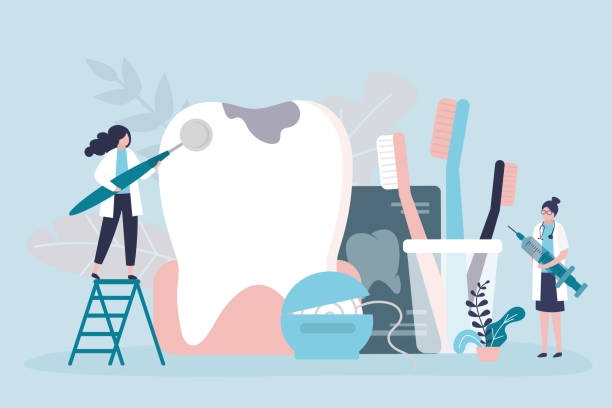Contact Us Today!
The Effects of Black Mold on Teeth & Oral Health
Posted on February 23rd, 2023

Is There A Correlation Between Damage to Teeth and Mold?
Many of us are heavily aware of the impact things like sugar, acidic foods, and poor oral hygiene can have on our smile. However, there is a lesser known threat to your dental health that could be lurking almost anywhere in your home. Black mold has been associated with causing black teeth in kids and adults (cavities), bad breath, a heightened risk of gum disease, worsening tooth decay, and other health problems.
Black mold can be found under sinks, in crevices of sippy cups and bottles, other drinkware, window sills, and anywhere excess moisture may be lingering, such as behind walls or in bathrooms.
Unfortunately, just as it’s possible to find black mold in a cup or growing in your basement, it’s also possible to find black mold on dentures, a removable retainer, or black mold on a toothbrush. This is why it’s so important to carefully maintain your brushing and flossing instruments and other dental devices.
Can Mold Grow in Your Mouth?
Black mold on teeth is not common, however, if black mold enters the mouth it can lead to Candida growth on the tongue, gum tissue, and cheeks. This can result in oral thrush, a fungal infection of the oral cavity.
Additionally, if this species of fungi comes into contact with a damaging oral bacteria known as Streptococcus mutans, which is known for causing cavities, then the two can combine and form a sticky film which will coat the teeth and lead to tooth decay.
Rotten teeth, or “moldy teeth,” are severely decayed teeth that often appear dark in areas. If you notice several teeth or a single tooth is black, or you experience other symptoms of dental mold exposure, like bad breath, bleeding gums, swollen gums, etc., then you may be dealing with the oral side effects of a black mold infestation.
Airborne or Direct Contact Exposure
Many people can be exposed to black mold without even knowing it. Black mold is commonly found in sippy cups, thermoses, coffee transport mugs, and other beverage containers that have small, hard to clean openings and crevices. This means adults and children come into direct contact with black mold when they drink from these containers.
People can also be exposed to black mold if it is growing on their toothbrush, mouth guard, retainer, dentures, etc.
Additionally, people can be susceptible to black mold spores in the air. If there is black mold growing beneath a sink, behind a wall, between shower doors, in carpet fibers, etc., then the spores can travel through the air and be inhaled without a person even knowing it.
Inhaling black mold spores can cause a variety of symptoms, including:
- Sneezing
- Coughing
- Eye Irritation
- Skin Irritation
- Respiratory Problems
- Congestion
- Mouth Breathing (which leads to dry mouth)
- A Burning Sensation of the Mucous Membranes (i.e. sore throat)
- Bleeding or Swelling of the Mucous Membranes
Where is Black Mold Found?
Black mold is commonly found in the following places:
- Thermoses/Bottles/Sippy Cups/other Transportable Beverage Containers
- Tupperware Containers
- Jars
- Toothbrush Covers/Travel Containers
- Carpeting (under or within the fibers)
- Behind Walls/Under Floorboards
- Under Sinks
- Shower Stalls/Bathrooms
- Window Sills
- Attics
- Air Vents
- Crawlspaces
- Areas that Once Flooded
- Any Warm, Damp Locations in a Home
Contact Windy City Family Dental when Black Mold Causes Cavities
If you are concerned about the health of your teeth after being exposed to black mold, or you have noticed an area that’s black on the inside of a tooth and are concerned it’s one of the side effects of tooth mold and/or oral thrush, then reach out to schedule an appointment with Windy City Family Dental today.
Our team is here to help protect your teeth against all types of dental issues, from cavities linked to mold exposure, to dental hygiene counseling- You can count on us!













